Case Study: Cognitive Behavioral Approach to Nik Jones' Mental Health
VerifiedAdded on 2023/04/22
|15
|4692
|103
Case Study
AI Summary
This case study focuses on Nik Jones, a 40-year-old male struggling with ADHD, anger, anxiety, and reactive depression. The case conceptualization employs Cognitive Behavioral Theory (CBT) to understand the factors hindering Jones' emotional well-being. It details his history, including marital separation, legal issues, and family dynamics. The analysis covers his presentation, psychosocial history, and substance use. The study aims to develop both short-term and long-term treatment plans tailored to Jones' specific needs, offering insights into CBT's application in managing complex mental health issues. Desklib provides this case study along with other solved assignments.
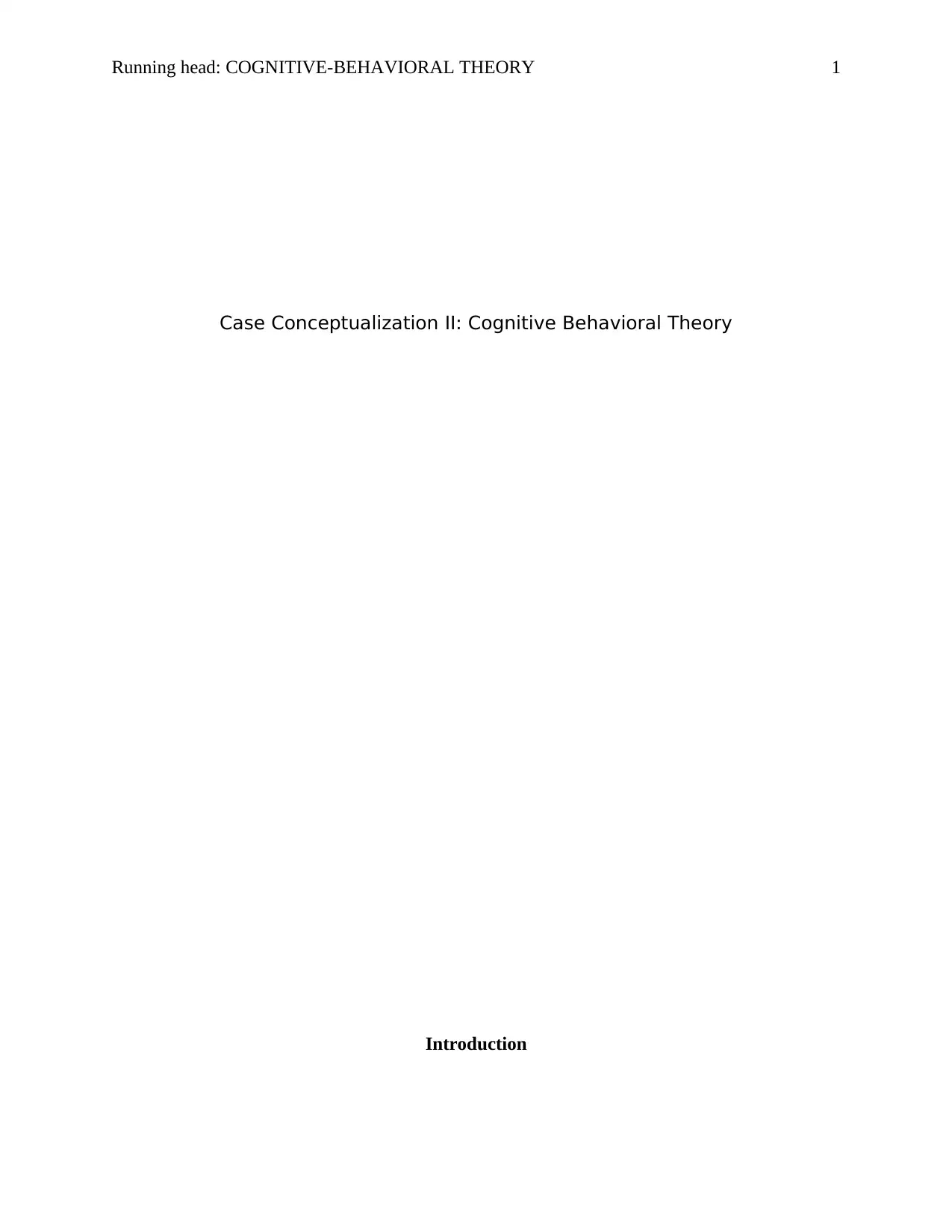
Running head: COGNITIVE-BEHAVIORAL THEORY 1
Case Conceptualization II: Cognitive Behavioral Theory
Introduction
Case Conceptualization II: Cognitive Behavioral Theory
Introduction
Paraphrase This Document
Need a fresh take? Get an instant paraphrase of this document with our AI Paraphraser
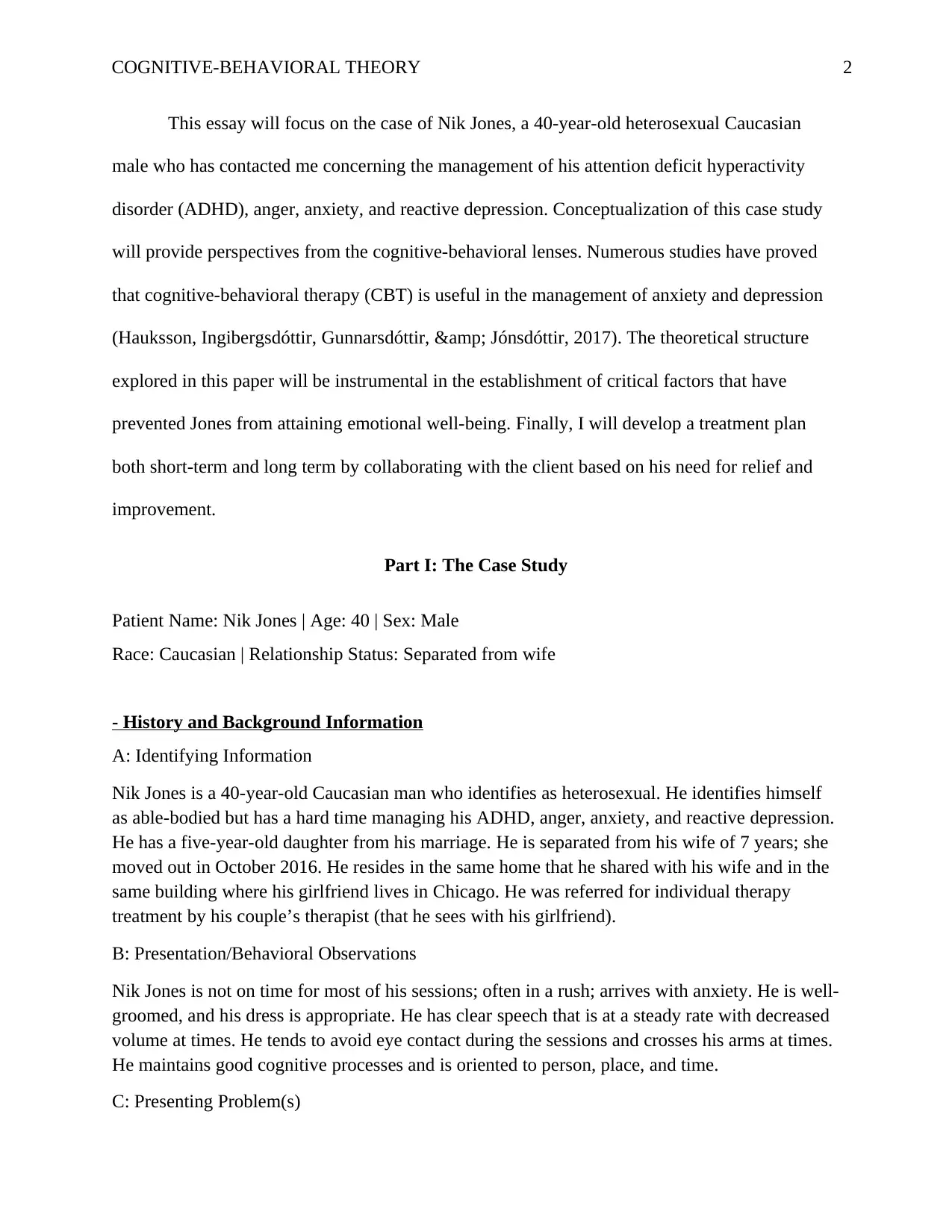
COGNITIVE-BEHAVIORAL THEORY 2
This essay will focus on the case of Nik Jones, a 40-year-old heterosexual Caucasian
male who has contacted me concerning the management of his attention deficit hyperactivity
disorder (ADHD), anger, anxiety, and reactive depression. Conceptualization of this case study
will provide perspectives from the cognitive-behavioral lenses. Numerous studies have proved
that cognitive-behavioral therapy (CBT) is useful in the management of anxiety and depression
(Hauksson, Ingibergsdóttir, Gunnarsdóttir, & Jónsdóttir, 2017). The theoretical structure
explored in this paper will be instrumental in the establishment of critical factors that have
prevented Jones from attaining emotional well-being. Finally, I will develop a treatment plan
both short-term and long term by collaborating with the client based on his need for relief and
improvement.
Part I: The Case Study
Patient Name: Nik Jones | Age: 40 | Sex: Male
Race: Caucasian | Relationship Status: Separated from wife
- History and Background Information
A: Identifying Information
Nik Jones is a 40-year-old Caucasian man who identifies as heterosexual. He identifies himself
as able-bodied but has a hard time managing his ADHD, anger, anxiety, and reactive depression.
He has a five-year-old daughter from his marriage. He is separated from his wife of 7 years; she
moved out in October 2016. He resides in the same home that he shared with his wife and in the
same building where his girlfriend lives in Chicago. He was referred for individual therapy
treatment by his couple’s therapist (that he sees with his girlfriend).
B: Presentation/Behavioral Observations
Nik Jones is not on time for most of his sessions; often in a rush; arrives with anxiety. He is well-
groomed, and his dress is appropriate. He has clear speech that is at a steady rate with decreased
volume at times. He tends to avoid eye contact during the sessions and crosses his arms at times.
He maintains good cognitive processes and is oriented to person, place, and time.
C: Presenting Problem(s)
This essay will focus on the case of Nik Jones, a 40-year-old heterosexual Caucasian
male who has contacted me concerning the management of his attention deficit hyperactivity
disorder (ADHD), anger, anxiety, and reactive depression. Conceptualization of this case study
will provide perspectives from the cognitive-behavioral lenses. Numerous studies have proved
that cognitive-behavioral therapy (CBT) is useful in the management of anxiety and depression
(Hauksson, Ingibergsdóttir, Gunnarsdóttir, & Jónsdóttir, 2017). The theoretical structure
explored in this paper will be instrumental in the establishment of critical factors that have
prevented Jones from attaining emotional well-being. Finally, I will develop a treatment plan
both short-term and long term by collaborating with the client based on his need for relief and
improvement.
Part I: The Case Study
Patient Name: Nik Jones | Age: 40 | Sex: Male
Race: Caucasian | Relationship Status: Separated from wife
- History and Background Information
A: Identifying Information
Nik Jones is a 40-year-old Caucasian man who identifies as heterosexual. He identifies himself
as able-bodied but has a hard time managing his ADHD, anger, anxiety, and reactive depression.
He has a five-year-old daughter from his marriage. He is separated from his wife of 7 years; she
moved out in October 2016. He resides in the same home that he shared with his wife and in the
same building where his girlfriend lives in Chicago. He was referred for individual therapy
treatment by his couple’s therapist (that he sees with his girlfriend).
B: Presentation/Behavioral Observations
Nik Jones is not on time for most of his sessions; often in a rush; arrives with anxiety. He is well-
groomed, and his dress is appropriate. He has clear speech that is at a steady rate with decreased
volume at times. He tends to avoid eye contact during the sessions and crosses his arms at times.
He maintains good cognitive processes and is oriented to person, place, and time.
C: Presenting Problem(s)
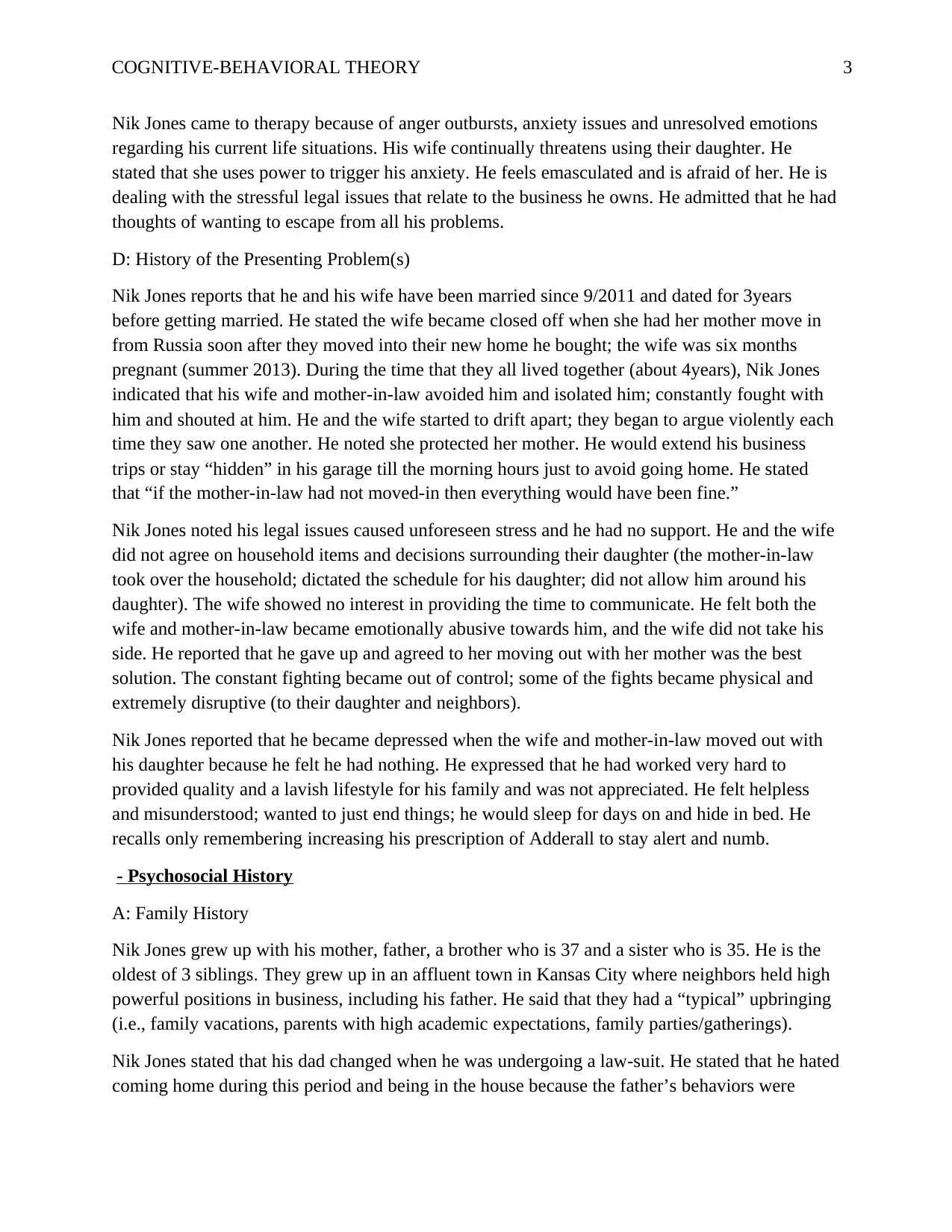
COGNITIVE-BEHAVIORAL THEORY 3
Nik Jones came to therapy because of anger outbursts, anxiety issues and unresolved emotions
regarding his current life situations. His wife continually threatens using their daughter. He
stated that she uses power to trigger his anxiety. He feels emasculated and is afraid of her. He is
dealing with the stressful legal issues that relate to the business he owns. He admitted that he had
thoughts of wanting to escape from all his problems.
D: History of the Presenting Problem(s)
Nik Jones reports that he and his wife have been married since 9/2011 and dated for 3years
before getting married. He stated the wife became closed off when she had her mother move in
from Russia soon after they moved into their new home he bought; the wife was six months
pregnant (summer 2013). During the time that they all lived together (about 4years), Nik Jones
indicated that his wife and mother-in-law avoided him and isolated him; constantly fought with
him and shouted at him. He and the wife started to drift apart; they began to argue violently each
time they saw one another. He noted she protected her mother. He would extend his business
trips or stay “hidden” in his garage till the morning hours just to avoid going home. He stated
that “if the mother-in-law had not moved-in then everything would have been fine.”
Nik Jones noted his legal issues caused unforeseen stress and he had no support. He and the wife
did not agree on household items and decisions surrounding their daughter (the mother-in-law
took over the household; dictated the schedule for his daughter; did not allow him around his
daughter). The wife showed no interest in providing the time to communicate. He felt both the
wife and mother-in-law became emotionally abusive towards him, and the wife did not take his
side. He reported that he gave up and agreed to her moving out with her mother was the best
solution. The constant fighting became out of control; some of the fights became physical and
extremely disruptive (to their daughter and neighbors).
Nik Jones reported that he became depressed when the wife and mother-in-law moved out with
his daughter because he felt he had nothing. He expressed that he had worked very hard to
provided quality and a lavish lifestyle for his family and was not appreciated. He felt helpless
and misunderstood; wanted to just end things; he would sleep for days on and hide in bed. He
recalls only remembering increasing his prescription of Adderall to stay alert and numb.
- Psychosocial History
A: Family History
Nik Jones grew up with his mother, father, a brother who is 37 and a sister who is 35. He is the
oldest of 3 siblings. They grew up in an affluent town in Kansas City where neighbors held high
powerful positions in business, including his father. He said that they had a “typical” upbringing
(i.e., family vacations, parents with high academic expectations, family parties/gatherings).
Nik Jones stated that his dad changed when he was undergoing a law-suit. He stated that he hated
coming home during this period and being in the house because the father’s behaviors were
Nik Jones came to therapy because of anger outbursts, anxiety issues and unresolved emotions
regarding his current life situations. His wife continually threatens using their daughter. He
stated that she uses power to trigger his anxiety. He feels emasculated and is afraid of her. He is
dealing with the stressful legal issues that relate to the business he owns. He admitted that he had
thoughts of wanting to escape from all his problems.
D: History of the Presenting Problem(s)
Nik Jones reports that he and his wife have been married since 9/2011 and dated for 3years
before getting married. He stated the wife became closed off when she had her mother move in
from Russia soon after they moved into their new home he bought; the wife was six months
pregnant (summer 2013). During the time that they all lived together (about 4years), Nik Jones
indicated that his wife and mother-in-law avoided him and isolated him; constantly fought with
him and shouted at him. He and the wife started to drift apart; they began to argue violently each
time they saw one another. He noted she protected her mother. He would extend his business
trips or stay “hidden” in his garage till the morning hours just to avoid going home. He stated
that “if the mother-in-law had not moved-in then everything would have been fine.”
Nik Jones noted his legal issues caused unforeseen stress and he had no support. He and the wife
did not agree on household items and decisions surrounding their daughter (the mother-in-law
took over the household; dictated the schedule for his daughter; did not allow him around his
daughter). The wife showed no interest in providing the time to communicate. He felt both the
wife and mother-in-law became emotionally abusive towards him, and the wife did not take his
side. He reported that he gave up and agreed to her moving out with her mother was the best
solution. The constant fighting became out of control; some of the fights became physical and
extremely disruptive (to their daughter and neighbors).
Nik Jones reported that he became depressed when the wife and mother-in-law moved out with
his daughter because he felt he had nothing. He expressed that he had worked very hard to
provided quality and a lavish lifestyle for his family and was not appreciated. He felt helpless
and misunderstood; wanted to just end things; he would sleep for days on and hide in bed. He
recalls only remembering increasing his prescription of Adderall to stay alert and numb.
- Psychosocial History
A: Family History
Nik Jones grew up with his mother, father, a brother who is 37 and a sister who is 35. He is the
oldest of 3 siblings. They grew up in an affluent town in Kansas City where neighbors held high
powerful positions in business, including his father. He said that they had a “typical” upbringing
(i.e., family vacations, parents with high academic expectations, family parties/gatherings).
Nik Jones stated that his dad changed when he was undergoing a law-suit. He stated that he hated
coming home during this period and being in the house because the father’s behaviors were
⊘ This is a preview!⊘
Do you want full access?
Subscribe today to unlock all pages.

Trusted by 1+ million students worldwide
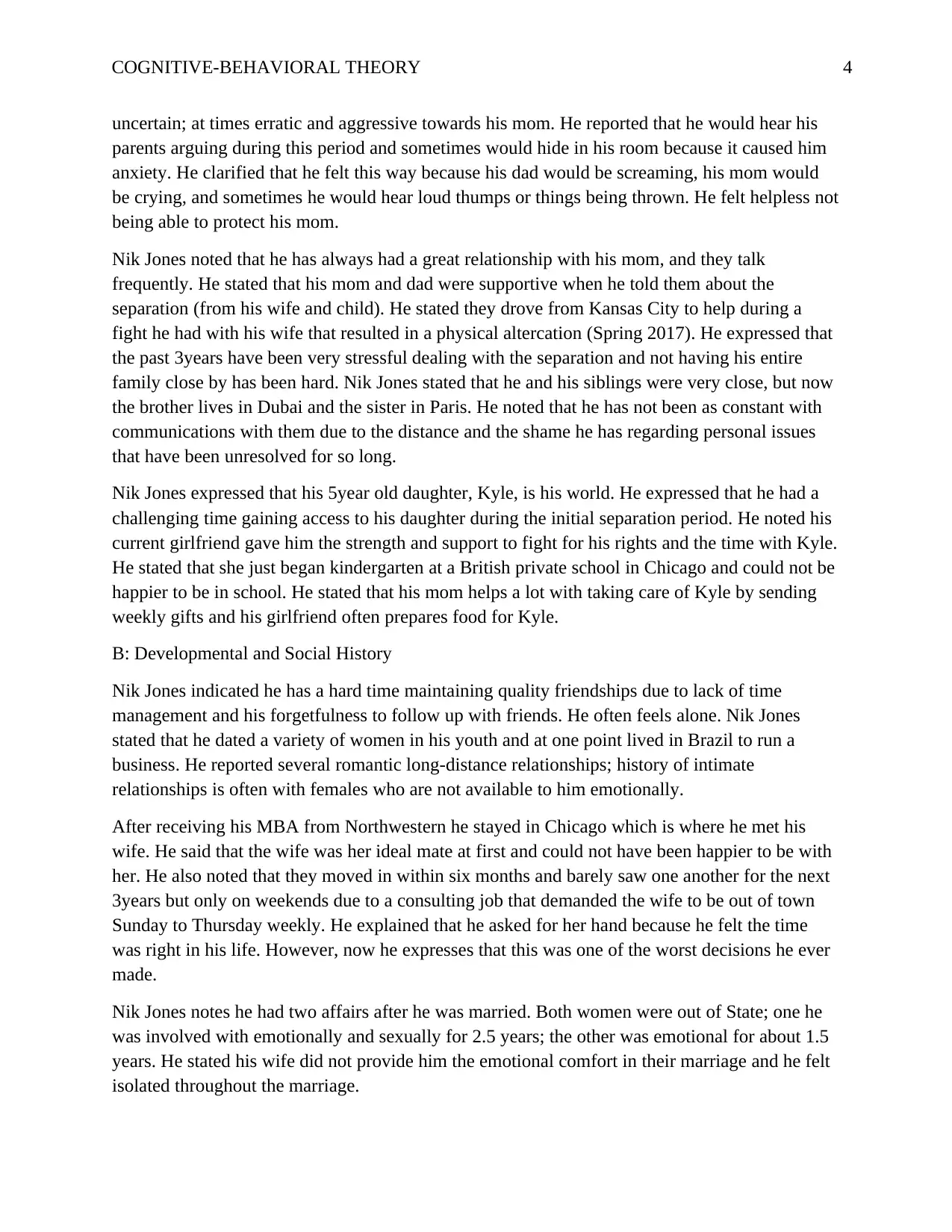
COGNITIVE-BEHAVIORAL THEORY 4
uncertain; at times erratic and aggressive towards his mom. He reported that he would hear his
parents arguing during this period and sometimes would hide in his room because it caused him
anxiety. He clarified that he felt this way because his dad would be screaming, his mom would
be crying, and sometimes he would hear loud thumps or things being thrown. He felt helpless not
being able to protect his mom.
Nik Jones noted that he has always had a great relationship with his mom, and they talk
frequently. He stated that his mom and dad were supportive when he told them about the
separation (from his wife and child). He stated they drove from Kansas City to help during a
fight he had with his wife that resulted in a physical altercation (Spring 2017). He expressed that
the past 3years have been very stressful dealing with the separation and not having his entire
family close by has been hard. Nik Jones stated that he and his siblings were very close, but now
the brother lives in Dubai and the sister in Paris. He noted that he has not been as constant with
communications with them due to the distance and the shame he has regarding personal issues
that have been unresolved for so long.
Nik Jones expressed that his 5year old daughter, Kyle, is his world. He expressed that he had a
challenging time gaining access to his daughter during the initial separation period. He noted his
current girlfriend gave him the strength and support to fight for his rights and the time with Kyle.
He stated that she just began kindergarten at a British private school in Chicago and could not be
happier to be in school. He stated that his mom helps a lot with taking care of Kyle by sending
weekly gifts and his girlfriend often prepares food for Kyle.
B: Developmental and Social History
Nik Jones indicated he has a hard time maintaining quality friendships due to lack of time
management and his forgetfulness to follow up with friends. He often feels alone. Nik Jones
stated that he dated a variety of women in his youth and at one point lived in Brazil to run a
business. He reported several romantic long-distance relationships; history of intimate
relationships is often with females who are not available to him emotionally.
After receiving his MBA from Northwestern he stayed in Chicago which is where he met his
wife. He said that the wife was her ideal mate at first and could not have been happier to be with
her. He also noted that they moved in within six months and barely saw one another for the next
3years but only on weekends due to a consulting job that demanded the wife to be out of town
Sunday to Thursday weekly. He explained that he asked for her hand because he felt the time
was right in his life. However, now he expresses that this was one of the worst decisions he ever
made.
Nik Jones notes he had two affairs after he was married. Both women were out of State; one he
was involved with emotionally and sexually for 2.5 years; the other was emotional for about 1.5
years. He stated his wife did not provide him the emotional comfort in their marriage and he felt
isolated throughout the marriage.
uncertain; at times erratic and aggressive towards his mom. He reported that he would hear his
parents arguing during this period and sometimes would hide in his room because it caused him
anxiety. He clarified that he felt this way because his dad would be screaming, his mom would
be crying, and sometimes he would hear loud thumps or things being thrown. He felt helpless not
being able to protect his mom.
Nik Jones noted that he has always had a great relationship with his mom, and they talk
frequently. He stated that his mom and dad were supportive when he told them about the
separation (from his wife and child). He stated they drove from Kansas City to help during a
fight he had with his wife that resulted in a physical altercation (Spring 2017). He expressed that
the past 3years have been very stressful dealing with the separation and not having his entire
family close by has been hard. Nik Jones stated that he and his siblings were very close, but now
the brother lives in Dubai and the sister in Paris. He noted that he has not been as constant with
communications with them due to the distance and the shame he has regarding personal issues
that have been unresolved for so long.
Nik Jones expressed that his 5year old daughter, Kyle, is his world. He expressed that he had a
challenging time gaining access to his daughter during the initial separation period. He noted his
current girlfriend gave him the strength and support to fight for his rights and the time with Kyle.
He stated that she just began kindergarten at a British private school in Chicago and could not be
happier to be in school. He stated that his mom helps a lot with taking care of Kyle by sending
weekly gifts and his girlfriend often prepares food for Kyle.
B: Developmental and Social History
Nik Jones indicated he has a hard time maintaining quality friendships due to lack of time
management and his forgetfulness to follow up with friends. He often feels alone. Nik Jones
stated that he dated a variety of women in his youth and at one point lived in Brazil to run a
business. He reported several romantic long-distance relationships; history of intimate
relationships is often with females who are not available to him emotionally.
After receiving his MBA from Northwestern he stayed in Chicago which is where he met his
wife. He said that the wife was her ideal mate at first and could not have been happier to be with
her. He also noted that they moved in within six months and barely saw one another for the next
3years but only on weekends due to a consulting job that demanded the wife to be out of town
Sunday to Thursday weekly. He explained that he asked for her hand because he felt the time
was right in his life. However, now he expresses that this was one of the worst decisions he ever
made.
Nik Jones notes he had two affairs after he was married. Both women were out of State; one he
was involved with emotionally and sexually for 2.5 years; the other was emotional for about 1.5
years. He stated his wife did not provide him the emotional comfort in their marriage and he felt
isolated throughout the marriage.
Paraphrase This Document
Need a fresh take? Get an instant paraphrase of this document with our AI Paraphraser
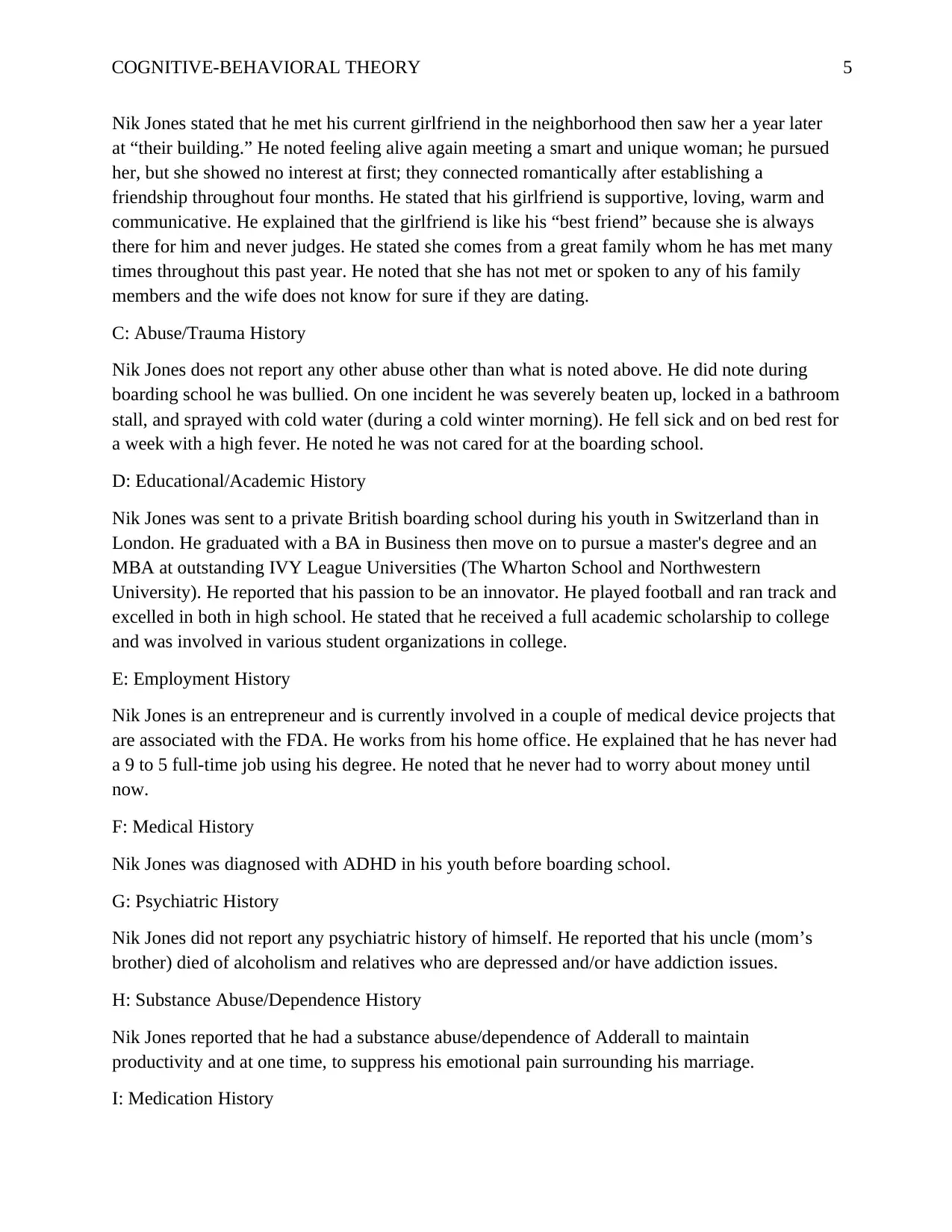
COGNITIVE-BEHAVIORAL THEORY 5
Nik Jones stated that he met his current girlfriend in the neighborhood then saw her a year later
at “their building.” He noted feeling alive again meeting a smart and unique woman; he pursued
her, but she showed no interest at first; they connected romantically after establishing a
friendship throughout four months. He stated that his girlfriend is supportive, loving, warm and
communicative. He explained that the girlfriend is like his “best friend” because she is always
there for him and never judges. He stated she comes from a great family whom he has met many
times throughout this past year. He noted that she has not met or spoken to any of his family
members and the wife does not know for sure if they are dating.
C: Abuse/Trauma History
Nik Jones does not report any other abuse other than what is noted above. He did note during
boarding school he was bullied. On one incident he was severely beaten up, locked in a bathroom
stall, and sprayed with cold water (during a cold winter morning). He fell sick and on bed rest for
a week with a high fever. He noted he was not cared for at the boarding school.
D: Educational/Academic History
Nik Jones was sent to a private British boarding school during his youth in Switzerland than in
London. He graduated with a BA in Business then move on to pursue a master's degree and an
MBA at outstanding IVY League Universities (The Wharton School and Northwestern
University). He reported that his passion to be an innovator. He played football and ran track and
excelled in both in high school. He stated that he received a full academic scholarship to college
and was involved in various student organizations in college.
E: Employment History
Nik Jones is an entrepreneur and is currently involved in a couple of medical device projects that
are associated with the FDA. He works from his home office. He explained that he has never had
a 9 to 5 full-time job using his degree. He noted that he never had to worry about money until
now.
F: Medical History
Nik Jones was diagnosed with ADHD in his youth before boarding school.
G: Psychiatric History
Nik Jones did not report any psychiatric history of himself. He reported that his uncle (mom’s
brother) died of alcoholism and relatives who are depressed and/or have addiction issues.
H: Substance Abuse/Dependence History
Nik Jones reported that he had a substance abuse/dependence of Adderall to maintain
productivity and at one time, to suppress his emotional pain surrounding his marriage.
I: Medication History
Nik Jones stated that he met his current girlfriend in the neighborhood then saw her a year later
at “their building.” He noted feeling alive again meeting a smart and unique woman; he pursued
her, but she showed no interest at first; they connected romantically after establishing a
friendship throughout four months. He stated that his girlfriend is supportive, loving, warm and
communicative. He explained that the girlfriend is like his “best friend” because she is always
there for him and never judges. He stated she comes from a great family whom he has met many
times throughout this past year. He noted that she has not met or spoken to any of his family
members and the wife does not know for sure if they are dating.
C: Abuse/Trauma History
Nik Jones does not report any other abuse other than what is noted above. He did note during
boarding school he was bullied. On one incident he was severely beaten up, locked in a bathroom
stall, and sprayed with cold water (during a cold winter morning). He fell sick and on bed rest for
a week with a high fever. He noted he was not cared for at the boarding school.
D: Educational/Academic History
Nik Jones was sent to a private British boarding school during his youth in Switzerland than in
London. He graduated with a BA in Business then move on to pursue a master's degree and an
MBA at outstanding IVY League Universities (The Wharton School and Northwestern
University). He reported that his passion to be an innovator. He played football and ran track and
excelled in both in high school. He stated that he received a full academic scholarship to college
and was involved in various student organizations in college.
E: Employment History
Nik Jones is an entrepreneur and is currently involved in a couple of medical device projects that
are associated with the FDA. He works from his home office. He explained that he has never had
a 9 to 5 full-time job using his degree. He noted that he never had to worry about money until
now.
F: Medical History
Nik Jones was diagnosed with ADHD in his youth before boarding school.
G: Psychiatric History
Nik Jones did not report any psychiatric history of himself. He reported that his uncle (mom’s
brother) died of alcoholism and relatives who are depressed and/or have addiction issues.
H: Substance Abuse/Dependence History
Nik Jones reported that he had a substance abuse/dependence of Adderall to maintain
productivity and at one time, to suppress his emotional pain surrounding his marriage.
I: Medication History
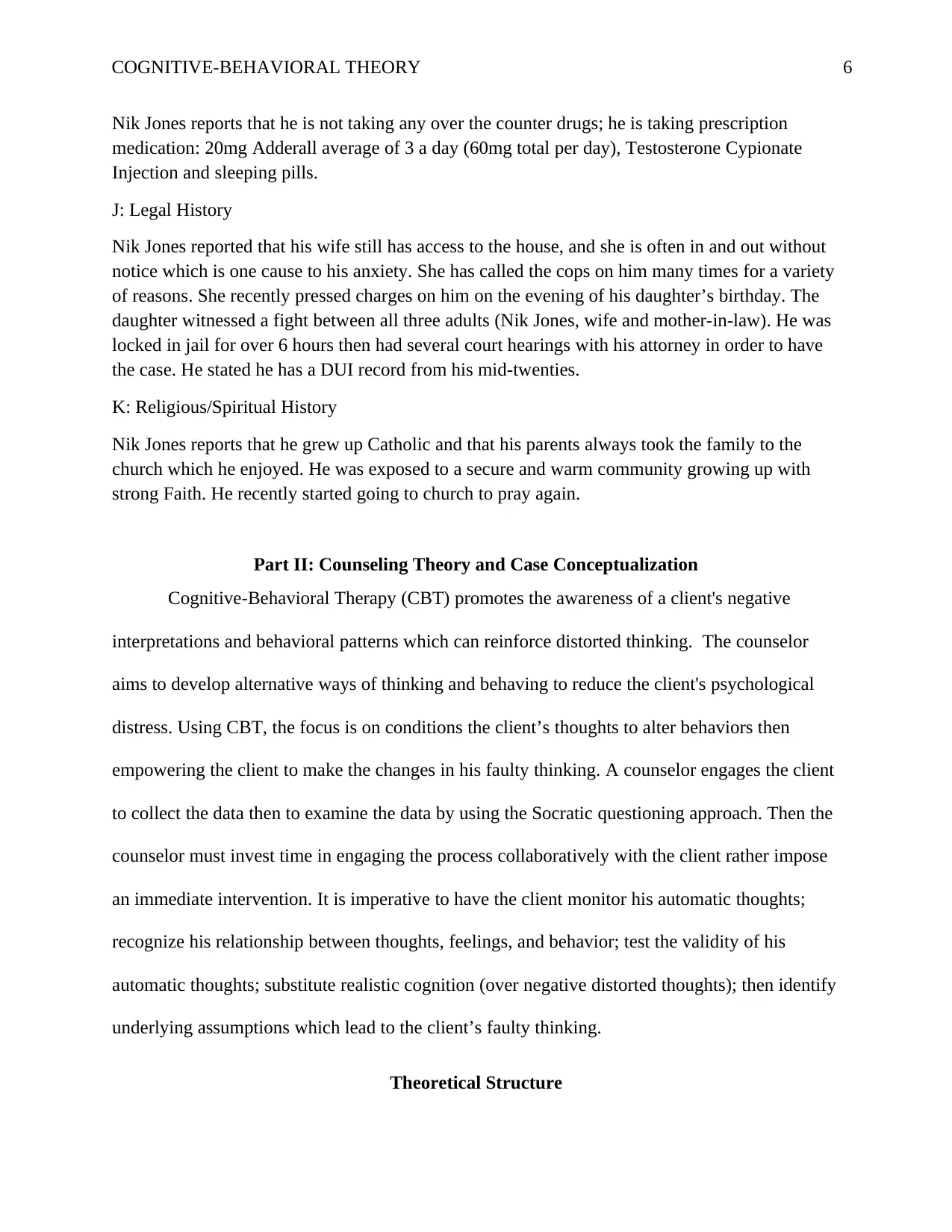
COGNITIVE-BEHAVIORAL THEORY 6
Nik Jones reports that he is not taking any over the counter drugs; he is taking prescription
medication: 20mg Adderall average of 3 a day (60mg total per day), Testosterone Cypionate
Injection and sleeping pills.
J: Legal History
Nik Jones reported that his wife still has access to the house, and she is often in and out without
notice which is one cause to his anxiety. She has called the cops on him many times for a variety
of reasons. She recently pressed charges on him on the evening of his daughter’s birthday. The
daughter witnessed a fight between all three adults (Nik Jones, wife and mother-in-law). He was
locked in jail for over 6 hours then had several court hearings with his attorney in order to have
the case. He stated he has a DUI record from his mid-twenties.
K: Religious/Spiritual History
Nik Jones reports that he grew up Catholic and that his parents always took the family to the
church which he enjoyed. He was exposed to a secure and warm community growing up with
strong Faith. He recently started going to church to pray again.
Part II: Counseling Theory and Case Conceptualization
Cognitive-Behavioral Therapy (CBT) promotes the awareness of a client's negative
interpretations and behavioral patterns which can reinforce distorted thinking. The counselor
aims to develop alternative ways of thinking and behaving to reduce the client's psychological
distress. Using CBT, the focus is on conditions the client’s thoughts to alter behaviors then
empowering the client to make the changes in his faulty thinking. A counselor engages the client
to collect the data then to examine the data by using the Socratic questioning approach. Then the
counselor must invest time in engaging the process collaboratively with the client rather impose
an immediate intervention. It is imperative to have the client monitor his automatic thoughts;
recognize his relationship between thoughts, feelings, and behavior; test the validity of his
automatic thoughts; substitute realistic cognition (over negative distorted thoughts); then identify
underlying assumptions which lead to the client’s faulty thinking.
Theoretical Structure
Nik Jones reports that he is not taking any over the counter drugs; he is taking prescription
medication: 20mg Adderall average of 3 a day (60mg total per day), Testosterone Cypionate
Injection and sleeping pills.
J: Legal History
Nik Jones reported that his wife still has access to the house, and she is often in and out without
notice which is one cause to his anxiety. She has called the cops on him many times for a variety
of reasons. She recently pressed charges on him on the evening of his daughter’s birthday. The
daughter witnessed a fight between all three adults (Nik Jones, wife and mother-in-law). He was
locked in jail for over 6 hours then had several court hearings with his attorney in order to have
the case. He stated he has a DUI record from his mid-twenties.
K: Religious/Spiritual History
Nik Jones reports that he grew up Catholic and that his parents always took the family to the
church which he enjoyed. He was exposed to a secure and warm community growing up with
strong Faith. He recently started going to church to pray again.
Part II: Counseling Theory and Case Conceptualization
Cognitive-Behavioral Therapy (CBT) promotes the awareness of a client's negative
interpretations and behavioral patterns which can reinforce distorted thinking. The counselor
aims to develop alternative ways of thinking and behaving to reduce the client's psychological
distress. Using CBT, the focus is on conditions the client’s thoughts to alter behaviors then
empowering the client to make the changes in his faulty thinking. A counselor engages the client
to collect the data then to examine the data by using the Socratic questioning approach. Then the
counselor must invest time in engaging the process collaboratively with the client rather impose
an immediate intervention. It is imperative to have the client monitor his automatic thoughts;
recognize his relationship between thoughts, feelings, and behavior; test the validity of his
automatic thoughts; substitute realistic cognition (over negative distorted thoughts); then identify
underlying assumptions which lead to the client’s faulty thinking.
Theoretical Structure
⊘ This is a preview!⊘
Do you want full access?
Subscribe today to unlock all pages.

Trusted by 1+ million students worldwide
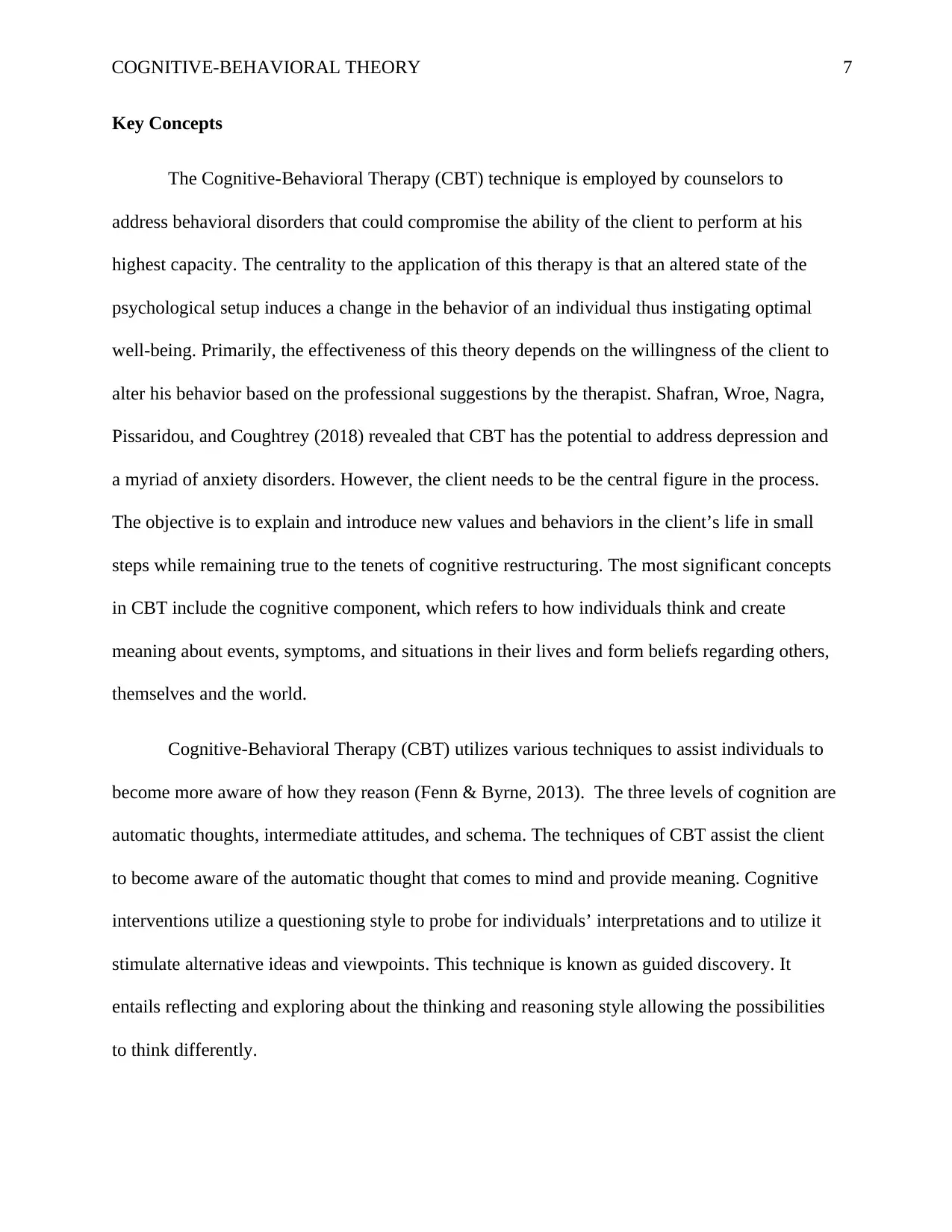
COGNITIVE-BEHAVIORAL THEORY 7
Key Concepts
The Cognitive-Behavioral Therapy (CBT) technique is employed by counselors to
address behavioral disorders that could compromise the ability of the client to perform at his
highest capacity. The centrality to the application of this therapy is that an altered state of the
psychological setup induces a change in the behavior of an individual thus instigating optimal
well-being. Primarily, the effectiveness of this theory depends on the willingness of the client to
alter his behavior based on the professional suggestions by the therapist. Shafran, Wroe, Nagra,
Pissaridou, and Coughtrey (2018) revealed that CBT has the potential to address depression and
a myriad of anxiety disorders. However, the client needs to be the central figure in the process.
The objective is to explain and introduce new values and behaviors in the client’s life in small
steps while remaining true to the tenets of cognitive restructuring. The most significant concepts
in CBT include the cognitive component, which refers to how individuals think and create
meaning about events, symptoms, and situations in their lives and form beliefs regarding others,
themselves and the world.
Cognitive-Behavioral Therapy (CBT) utilizes various techniques to assist individuals to
become more aware of how they reason (Fenn & Byrne, 2013). The three levels of cognition are
automatic thoughts, intermediate attitudes, and schema. The techniques of CBT assist the client
to become aware of the automatic thought that comes to mind and provide meaning. Cognitive
interventions utilize a questioning style to probe for individuals’ interpretations and to utilize it
stimulate alternative ideas and viewpoints. This technique is known as guided discovery. It
entails reflecting and exploring about the thinking and reasoning style allowing the possibilities
to think differently.
Key Concepts
The Cognitive-Behavioral Therapy (CBT) technique is employed by counselors to
address behavioral disorders that could compromise the ability of the client to perform at his
highest capacity. The centrality to the application of this therapy is that an altered state of the
psychological setup induces a change in the behavior of an individual thus instigating optimal
well-being. Primarily, the effectiveness of this theory depends on the willingness of the client to
alter his behavior based on the professional suggestions by the therapist. Shafran, Wroe, Nagra,
Pissaridou, and Coughtrey (2018) revealed that CBT has the potential to address depression and
a myriad of anxiety disorders. However, the client needs to be the central figure in the process.
The objective is to explain and introduce new values and behaviors in the client’s life in small
steps while remaining true to the tenets of cognitive restructuring. The most significant concepts
in CBT include the cognitive component, which refers to how individuals think and create
meaning about events, symptoms, and situations in their lives and form beliefs regarding others,
themselves and the world.
Cognitive-Behavioral Therapy (CBT) utilizes various techniques to assist individuals to
become more aware of how they reason (Fenn & Byrne, 2013). The three levels of cognition are
automatic thoughts, intermediate attitudes, and schema. The techniques of CBT assist the client
to become aware of the automatic thought that comes to mind and provide meaning. Cognitive
interventions utilize a questioning style to probe for individuals’ interpretations and to utilize it
stimulate alternative ideas and viewpoints. This technique is known as guided discovery. It
entails reflecting and exploring about the thinking and reasoning style allowing the possibilities
to think differently.
Paraphrase This Document
Need a fresh take? Get an instant paraphrase of this document with our AI Paraphraser
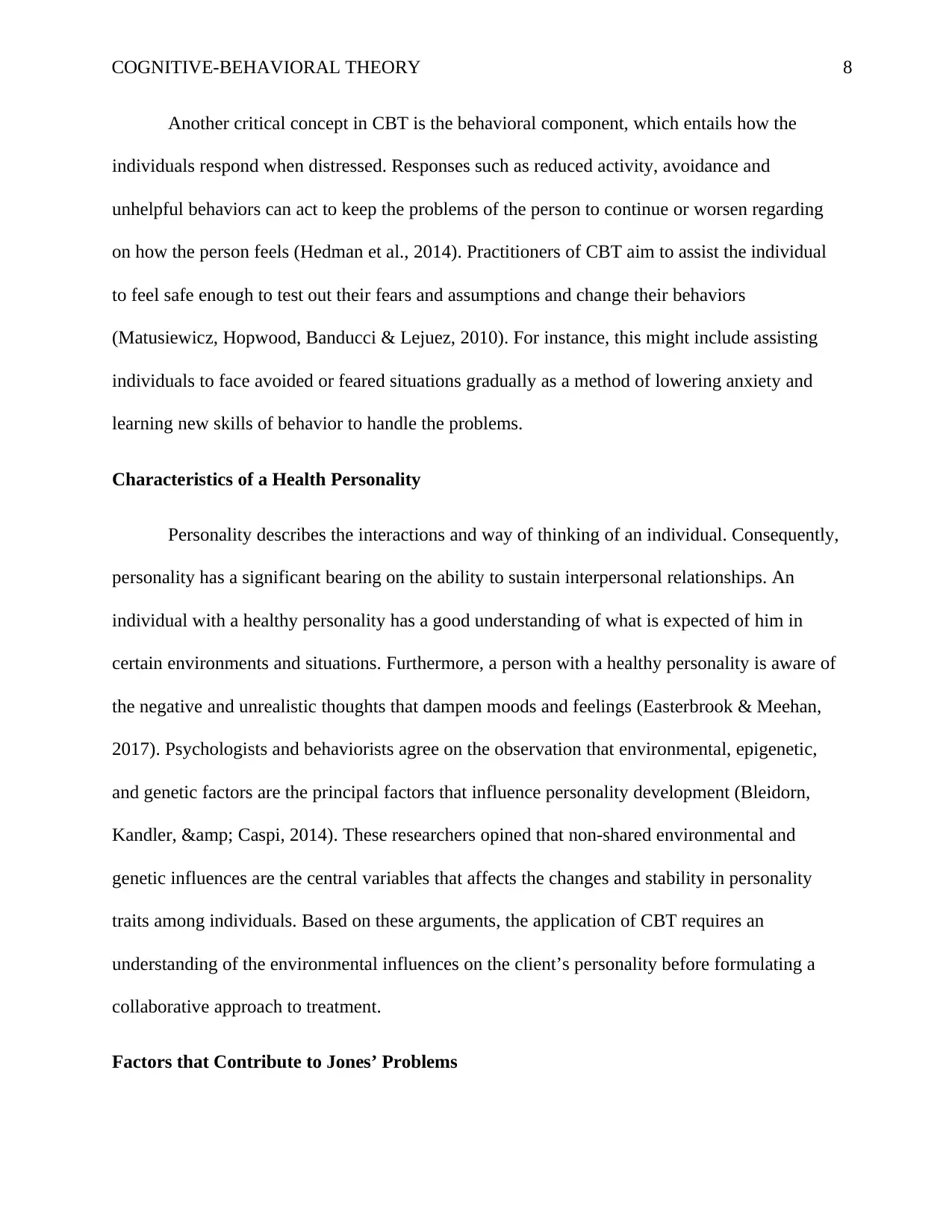
COGNITIVE-BEHAVIORAL THEORY 8
Another critical concept in CBT is the behavioral component, which entails how the
individuals respond when distressed. Responses such as reduced activity, avoidance and
unhelpful behaviors can act to keep the problems of the person to continue or worsen regarding
on how the person feels (Hedman et al., 2014). Practitioners of CBT aim to assist the individual
to feel safe enough to test out their fears and assumptions and change their behaviors
(Matusiewicz, Hopwood, Banducci & Lejuez, 2010). For instance, this might include assisting
individuals to face avoided or feared situations gradually as a method of lowering anxiety and
learning new skills of behavior to handle the problems.
Characteristics of a Health Personality
Personality describes the interactions and way of thinking of an individual. Consequently,
personality has a significant bearing on the ability to sustain interpersonal relationships. An
individual with a healthy personality has a good understanding of what is expected of him in
certain environments and situations. Furthermore, a person with a healthy personality is aware of
the negative and unrealistic thoughts that dampen moods and feelings (Easterbrook & Meehan,
2017). Psychologists and behaviorists agree on the observation that environmental, epigenetic,
and genetic factors are the principal factors that influence personality development (Bleidorn,
Kandler, & Caspi, 2014). These researchers opined that non-shared environmental and
genetic influences are the central variables that affects the changes and stability in personality
traits among individuals. Based on these arguments, the application of CBT requires an
understanding of the environmental influences on the client’s personality before formulating a
collaborative approach to treatment.
Factors that Contribute to Jones’ Problems
Another critical concept in CBT is the behavioral component, which entails how the
individuals respond when distressed. Responses such as reduced activity, avoidance and
unhelpful behaviors can act to keep the problems of the person to continue or worsen regarding
on how the person feels (Hedman et al., 2014). Practitioners of CBT aim to assist the individual
to feel safe enough to test out their fears and assumptions and change their behaviors
(Matusiewicz, Hopwood, Banducci & Lejuez, 2010). For instance, this might include assisting
individuals to face avoided or feared situations gradually as a method of lowering anxiety and
learning new skills of behavior to handle the problems.
Characteristics of a Health Personality
Personality describes the interactions and way of thinking of an individual. Consequently,
personality has a significant bearing on the ability to sustain interpersonal relationships. An
individual with a healthy personality has a good understanding of what is expected of him in
certain environments and situations. Furthermore, a person with a healthy personality is aware of
the negative and unrealistic thoughts that dampen moods and feelings (Easterbrook & Meehan,
2017). Psychologists and behaviorists agree on the observation that environmental, epigenetic,
and genetic factors are the principal factors that influence personality development (Bleidorn,
Kandler, & Caspi, 2014). These researchers opined that non-shared environmental and
genetic influences are the central variables that affects the changes and stability in personality
traits among individuals. Based on these arguments, the application of CBT requires an
understanding of the environmental influences on the client’s personality before formulating a
collaborative approach to treatment.
Factors that Contribute to Jones’ Problems
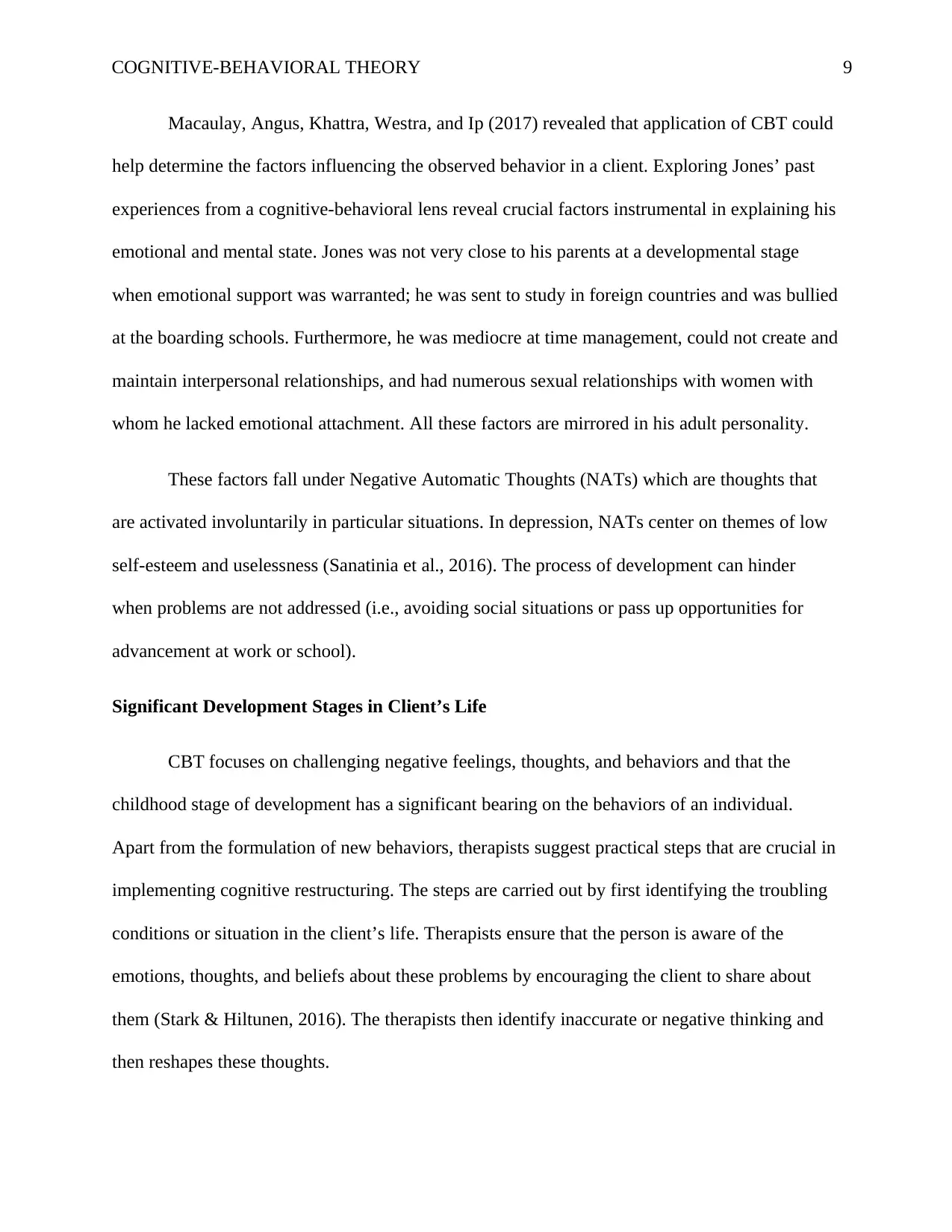
COGNITIVE-BEHAVIORAL THEORY 9
Macaulay, Angus, Khattra, Westra, and Ip (2017) revealed that application of CBT could
help determine the factors influencing the observed behavior in a client. Exploring Jones’ past
experiences from a cognitive-behavioral lens reveal crucial factors instrumental in explaining his
emotional and mental state. Jones was not very close to his parents at a developmental stage
when emotional support was warranted; he was sent to study in foreign countries and was bullied
at the boarding schools. Furthermore, he was mediocre at time management, could not create and
maintain interpersonal relationships, and had numerous sexual relationships with women with
whom he lacked emotional attachment. All these factors are mirrored in his adult personality.
These factors fall under Negative Automatic Thoughts (NATs) which are thoughts that
are activated involuntarily in particular situations. In depression, NATs center on themes of low
self-esteem and uselessness (Sanatinia et al., 2016). The process of development can hinder
when problems are not addressed (i.e., avoiding social situations or pass up opportunities for
advancement at work or school).
Significant Development Stages in Client’s Life
CBT focuses on challenging negative feelings, thoughts, and behaviors and that the
childhood stage of development has a significant bearing on the behaviors of an individual.
Apart from the formulation of new behaviors, therapists suggest practical steps that are crucial in
implementing cognitive restructuring. The steps are carried out by first identifying the troubling
conditions or situation in the client’s life. Therapists ensure that the person is aware of the
emotions, thoughts, and beliefs about these problems by encouraging the client to share about
them (Stark & Hiltunen, 2016). The therapists then identify inaccurate or negative thinking and
then reshapes these thoughts.
Macaulay, Angus, Khattra, Westra, and Ip (2017) revealed that application of CBT could
help determine the factors influencing the observed behavior in a client. Exploring Jones’ past
experiences from a cognitive-behavioral lens reveal crucial factors instrumental in explaining his
emotional and mental state. Jones was not very close to his parents at a developmental stage
when emotional support was warranted; he was sent to study in foreign countries and was bullied
at the boarding schools. Furthermore, he was mediocre at time management, could not create and
maintain interpersonal relationships, and had numerous sexual relationships with women with
whom he lacked emotional attachment. All these factors are mirrored in his adult personality.
These factors fall under Negative Automatic Thoughts (NATs) which are thoughts that
are activated involuntarily in particular situations. In depression, NATs center on themes of low
self-esteem and uselessness (Sanatinia et al., 2016). The process of development can hinder
when problems are not addressed (i.e., avoiding social situations or pass up opportunities for
advancement at work or school).
Significant Development Stages in Client’s Life
CBT focuses on challenging negative feelings, thoughts, and behaviors and that the
childhood stage of development has a significant bearing on the behaviors of an individual.
Apart from the formulation of new behaviors, therapists suggest practical steps that are crucial in
implementing cognitive restructuring. The steps are carried out by first identifying the troubling
conditions or situation in the client’s life. Therapists ensure that the person is aware of the
emotions, thoughts, and beliefs about these problems by encouraging the client to share about
them (Stark & Hiltunen, 2016). The therapists then identify inaccurate or negative thinking and
then reshapes these thoughts.
⊘ This is a preview!⊘
Do you want full access?
Subscribe today to unlock all pages.

Trusted by 1+ million students worldwide
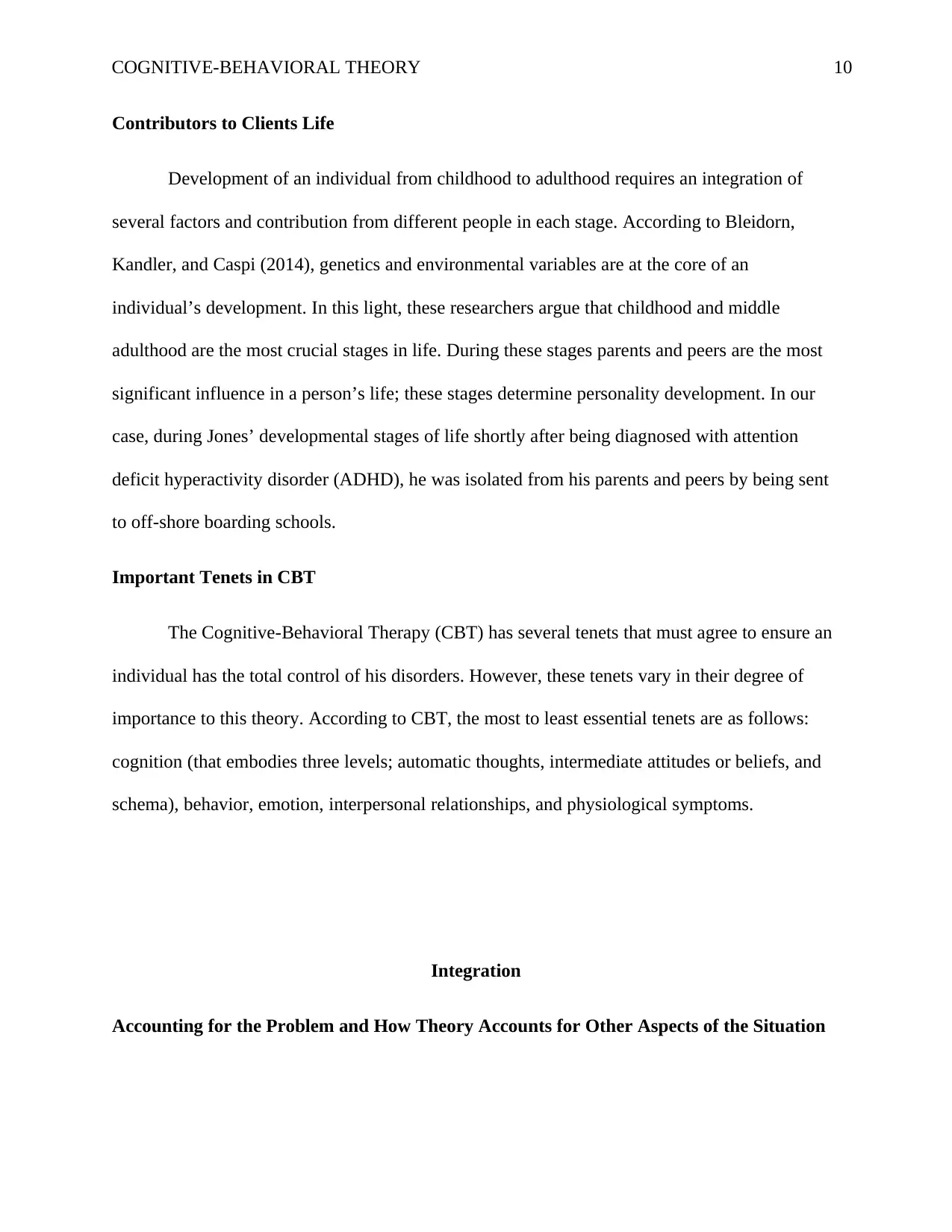
COGNITIVE-BEHAVIORAL THEORY 10
Contributors to Clients Life
Development of an individual from childhood to adulthood requires an integration of
several factors and contribution from different people in each stage. According to Bleidorn,
Kandler, and Caspi (2014), genetics and environmental variables are at the core of an
individual’s development. In this light, these researchers argue that childhood and middle
adulthood are the most crucial stages in life. During these stages parents and peers are the most
significant influence in a person’s life; these stages determine personality development. In our
case, during Jones’ developmental stages of life shortly after being diagnosed with attention
deficit hyperactivity disorder (ADHD), he was isolated from his parents and peers by being sent
to off-shore boarding schools.
Important Tenets in CBT
The Cognitive-Behavioral Therapy (CBT) has several tenets that must agree to ensure an
individual has the total control of his disorders. However, these tenets vary in their degree of
importance to this theory. According to CBT, the most to least essential tenets are as follows:
cognition (that embodies three levels; automatic thoughts, intermediate attitudes or beliefs, and
schema), behavior, emotion, interpersonal relationships, and physiological symptoms.
Integration
Accounting for the Problem and How Theory Accounts for Other Aspects of the Situation
Contributors to Clients Life
Development of an individual from childhood to adulthood requires an integration of
several factors and contribution from different people in each stage. According to Bleidorn,
Kandler, and Caspi (2014), genetics and environmental variables are at the core of an
individual’s development. In this light, these researchers argue that childhood and middle
adulthood are the most crucial stages in life. During these stages parents and peers are the most
significant influence in a person’s life; these stages determine personality development. In our
case, during Jones’ developmental stages of life shortly after being diagnosed with attention
deficit hyperactivity disorder (ADHD), he was isolated from his parents and peers by being sent
to off-shore boarding schools.
Important Tenets in CBT
The Cognitive-Behavioral Therapy (CBT) has several tenets that must agree to ensure an
individual has the total control of his disorders. However, these tenets vary in their degree of
importance to this theory. According to CBT, the most to least essential tenets are as follows:
cognition (that embodies three levels; automatic thoughts, intermediate attitudes or beliefs, and
schema), behavior, emotion, interpersonal relationships, and physiological symptoms.
Integration
Accounting for the Problem and How Theory Accounts for Other Aspects of the Situation
Paraphrase This Document
Need a fresh take? Get an instant paraphrase of this document with our AI Paraphraser
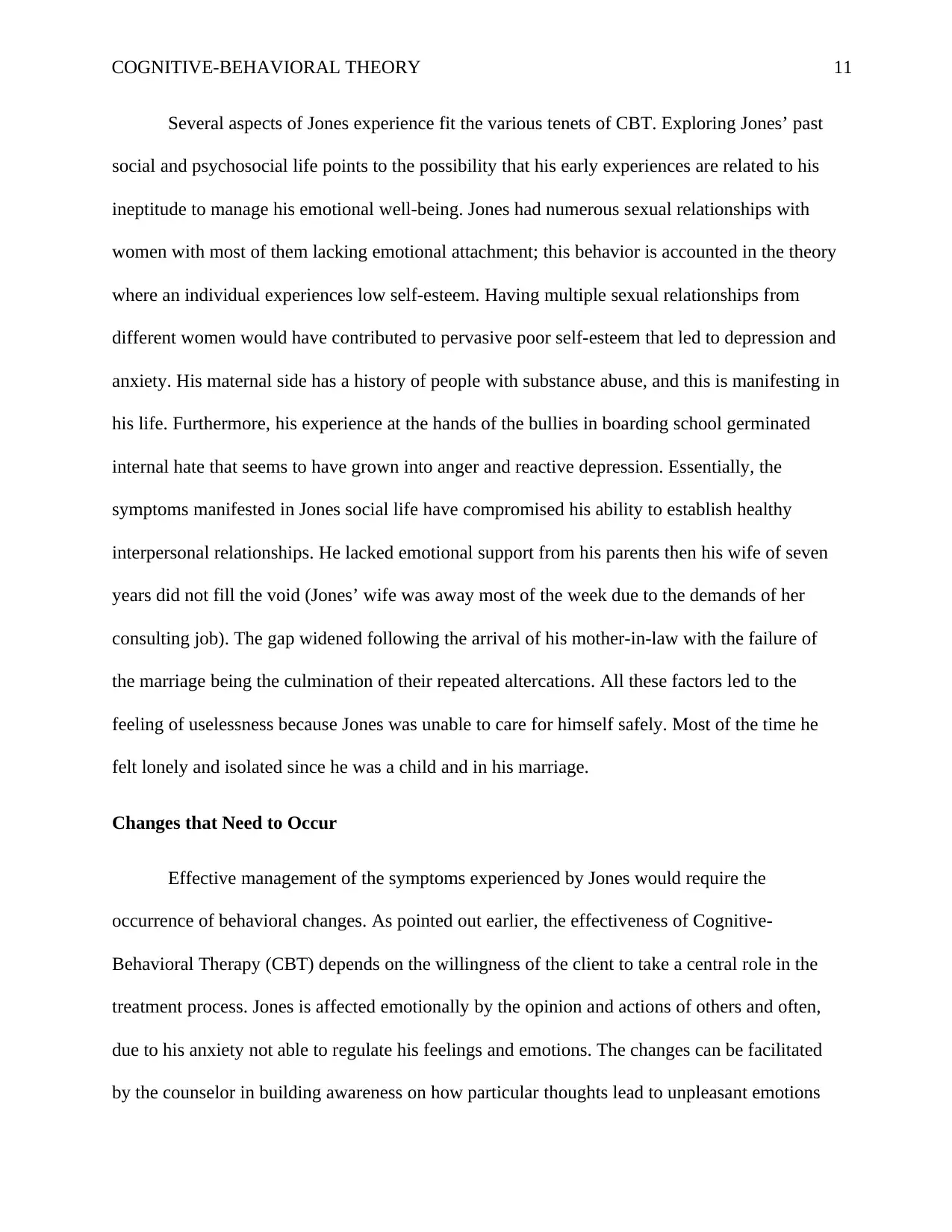
COGNITIVE-BEHAVIORAL THEORY 11
Several aspects of Jones experience fit the various tenets of CBT. Exploring Jones’ past
social and psychosocial life points to the possibility that his early experiences are related to his
ineptitude to manage his emotional well-being. Jones had numerous sexual relationships with
women with most of them lacking emotional attachment; this behavior is accounted in the theory
where an individual experiences low self-esteem. Having multiple sexual relationships from
different women would have contributed to pervasive poor self-esteem that led to depression and
anxiety. His maternal side has a history of people with substance abuse, and this is manifesting in
his life. Furthermore, his experience at the hands of the bullies in boarding school germinated
internal hate that seems to have grown into anger and reactive depression. Essentially, the
symptoms manifested in Jones social life have compromised his ability to establish healthy
interpersonal relationships. He lacked emotional support from his parents then his wife of seven
years did not fill the void (Jones’ wife was away most of the week due to the demands of her
consulting job). The gap widened following the arrival of his mother-in-law with the failure of
the marriage being the culmination of their repeated altercations. All these factors led to the
feeling of uselessness because Jones was unable to care for himself safely. Most of the time he
felt lonely and isolated since he was a child and in his marriage.
Changes that Need to Occur
Effective management of the symptoms experienced by Jones would require the
occurrence of behavioral changes. As pointed out earlier, the effectiveness of Cognitive-
Behavioral Therapy (CBT) depends on the willingness of the client to take a central role in the
treatment process. Jones is affected emotionally by the opinion and actions of others and often,
due to his anxiety not able to regulate his feelings and emotions. The changes can be facilitated
by the counselor in building awareness on how particular thoughts lead to unpleasant emotions
Several aspects of Jones experience fit the various tenets of CBT. Exploring Jones’ past
social and psychosocial life points to the possibility that his early experiences are related to his
ineptitude to manage his emotional well-being. Jones had numerous sexual relationships with
women with most of them lacking emotional attachment; this behavior is accounted in the theory
where an individual experiences low self-esteem. Having multiple sexual relationships from
different women would have contributed to pervasive poor self-esteem that led to depression and
anxiety. His maternal side has a history of people with substance abuse, and this is manifesting in
his life. Furthermore, his experience at the hands of the bullies in boarding school germinated
internal hate that seems to have grown into anger and reactive depression. Essentially, the
symptoms manifested in Jones social life have compromised his ability to establish healthy
interpersonal relationships. He lacked emotional support from his parents then his wife of seven
years did not fill the void (Jones’ wife was away most of the week due to the demands of her
consulting job). The gap widened following the arrival of his mother-in-law with the failure of
the marriage being the culmination of their repeated altercations. All these factors led to the
feeling of uselessness because Jones was unable to care for himself safely. Most of the time he
felt lonely and isolated since he was a child and in his marriage.
Changes that Need to Occur
Effective management of the symptoms experienced by Jones would require the
occurrence of behavioral changes. As pointed out earlier, the effectiveness of Cognitive-
Behavioral Therapy (CBT) depends on the willingness of the client to take a central role in the
treatment process. Jones is affected emotionally by the opinion and actions of others and often,
due to his anxiety not able to regulate his feelings and emotions. The changes can be facilitated
by the counselor in building awareness on how particular thoughts lead to unpleasant emotions
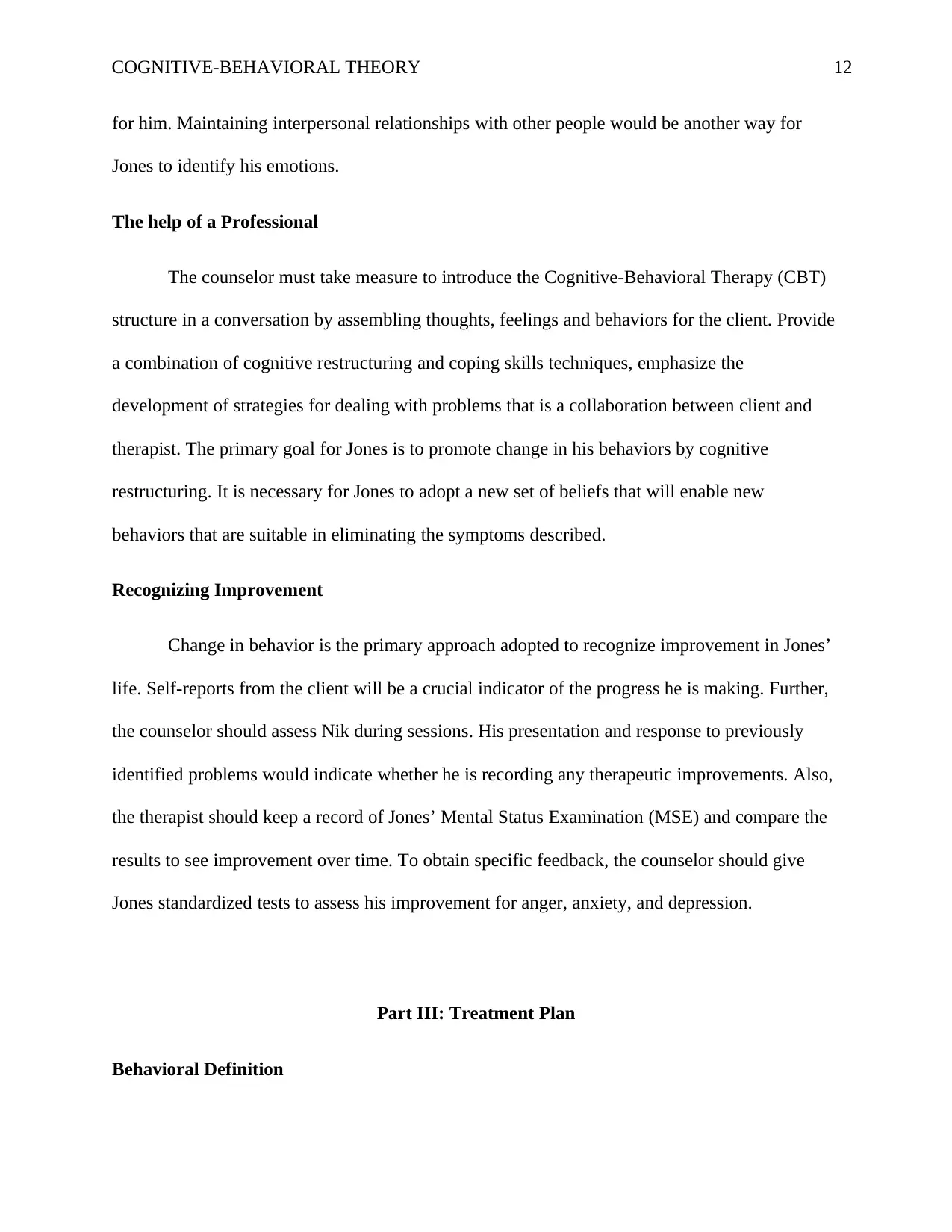
COGNITIVE-BEHAVIORAL THEORY 12
for him. Maintaining interpersonal relationships with other people would be another way for
Jones to identify his emotions.
The help of a Professional
The counselor must take measure to introduce the Cognitive-Behavioral Therapy (CBT)
structure in a conversation by assembling thoughts, feelings and behaviors for the client. Provide
a combination of cognitive restructuring and coping skills techniques, emphasize the
development of strategies for dealing with problems that is a collaboration between client and
therapist. The primary goal for Jones is to promote change in his behaviors by cognitive
restructuring. It is necessary for Jones to adopt a new set of beliefs that will enable new
behaviors that are suitable in eliminating the symptoms described.
Recognizing Improvement
Change in behavior is the primary approach adopted to recognize improvement in Jones’
life. Self-reports from the client will be a crucial indicator of the progress he is making. Further,
the counselor should assess Nik during sessions. His presentation and response to previously
identified problems would indicate whether he is recording any therapeutic improvements. Also,
the therapist should keep a record of Jones’ Mental Status Examination (MSE) and compare the
results to see improvement over time. To obtain specific feedback, the counselor should give
Jones standardized tests to assess his improvement for anger, anxiety, and depression.
Part III: Treatment Plan
Behavioral Definition
for him. Maintaining interpersonal relationships with other people would be another way for
Jones to identify his emotions.
The help of a Professional
The counselor must take measure to introduce the Cognitive-Behavioral Therapy (CBT)
structure in a conversation by assembling thoughts, feelings and behaviors for the client. Provide
a combination of cognitive restructuring and coping skills techniques, emphasize the
development of strategies for dealing with problems that is a collaboration between client and
therapist. The primary goal for Jones is to promote change in his behaviors by cognitive
restructuring. It is necessary for Jones to adopt a new set of beliefs that will enable new
behaviors that are suitable in eliminating the symptoms described.
Recognizing Improvement
Change in behavior is the primary approach adopted to recognize improvement in Jones’
life. Self-reports from the client will be a crucial indicator of the progress he is making. Further,
the counselor should assess Nik during sessions. His presentation and response to previously
identified problems would indicate whether he is recording any therapeutic improvements. Also,
the therapist should keep a record of Jones’ Mental Status Examination (MSE) and compare the
results to see improvement over time. To obtain specific feedback, the counselor should give
Jones standardized tests to assess his improvement for anger, anxiety, and depression.
Part III: Treatment Plan
Behavioral Definition
⊘ This is a preview!⊘
Do you want full access?
Subscribe today to unlock all pages.

Trusted by 1+ million students worldwide
1 out of 15
Related Documents
Your All-in-One AI-Powered Toolkit for Academic Success.
+13062052269
info@desklib.com
Available 24*7 on WhatsApp / Email
![[object Object]](/_next/static/media/star-bottom.7253800d.svg)
Unlock your academic potential
Copyright © 2020–2026 A2Z Services. All Rights Reserved. Developed and managed by ZUCOL.



